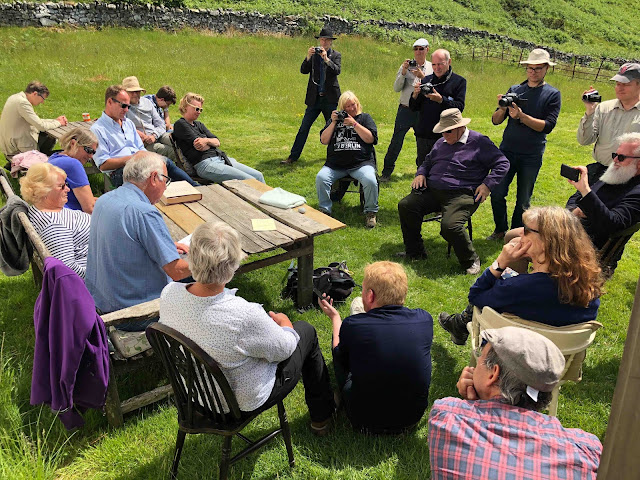VISIT TO BARNHILL ON JURA 2018:
The Isle of Jura, in the Inner Hebrides of Scotland, was the arcane site chosen by George Orwell to spend the finishing four years of his life writing his most celebrated novel Nineteen Eighty-Four. Once every two years, during the month of June, The Orwell Society and The Orwell Foundation arrange, under the auspice of Richard Blair (Orwell's son), a visit to the scene where he and his father, now and then accompanied by some relatives, lived from 1945 through 1949.
 The Isle of Jura is a unique and remote "paradise" island, which in spite of being not far from Glasgow, just 96 km away, it still involves a long trip of at least 4 hours back and forth. The nearest mainland harbour is at Crinan, where you have to take the Ferry which will set you on Jura in about one hour and a half. Once there, the sweet and inebriating smell of cottage whiskey welcomes your senses to a fermented feeling of antiquity.
The Isle of Jura is a unique and remote "paradise" island, which in spite of being not far from Glasgow, just 96 km away, it still involves a long trip of at least 4 hours back and forth. The nearest mainland harbour is at Crinan, where you have to take the Ferry which will set you on Jura in about one hour and a half. Once there, the sweet and inebriating smell of cottage whiskey welcomes your senses to a fermented feeling of antiquity.
The huge Jura Distillery building, founded in 1810, stands up majestically to let the visitor know that, in spite of the passage of centuries, it is still alive and kicking successfully, outspreading "the spirit of Scotland". This should also be the first building Orwell encountered when he put his foot down on Jura.
 |
| View from Cranaig House Harbour |
The nearby Jura Hotel, right opposite the distillery, is still the same cosy cottage, in wonderful conditions, which in Orwell's times lodged the few passers-by who visited the island, most of them wool staplers, farm workers, fishermen and the distillery workers. Orwell was not surely an attraction for the few neighbours on the isle at the times. And he did not intend to stay in Cranaig House, the little town centre, but, instead, he had decided to rent the remote cottage of Barnhill in the northernmost part of the island, about 30 miles from Cranaig. The island itself is about 35 miles long and 5 miles wide. In the times that Orwell lived on the isle, its population was about 2,000 inhabitants, nowadays there are no more than 200 people, most of them young families with children ready to repopulate it and bring it back to term.
 |
| Daybreak from Jura Hotel |
 |
| The small Waterfront with Jamie Fletcher waiting for us |
 |
| View of Barnhill from the Ferry |
 |
| The Greenish Path from the Waterfront to Barnhill |
Definitely, Orwell had intentionally decided to live too far off the human world. He had replaced humans by cows as neighbours, which brings to mind his satirical fable Animal Farm, published the same year of his arrival to Barnhill.
 |
| Cows grazing peacefully by the shoreline |
The farmhouse was in wonderfully good conditions, in spite of the passage of time. And the formidable facade of the house proved the magnificent condition of the building.
Orwell had rented the farmhouse on a remote island and in a desolate, though idyllic setting, of the island where he could find peace, inspiration, silence and time to write his greatest masterpiece, Nineteen Eighty-Four. Strangely enough, many of us agreed about the fact that despite the uninhabited region, nobody feels lonely. Isolation from the world is not the feeling you get in Barnhill, possibly detachment from civilization is the literal
 |
| Facade of Barnhill (June 10, 2018) |
Therefore, regardless of the rules of the Orwell Society about the strict prohibition on the taking of photographs, Australian Professor Darcy Moore could not resist the terrible temptation to take his camera and start shooting indiscriminately straight to the window and straight through the window under the undisturbed look of Richard Blair, in the middle of his speech on the "history" behind the room and the typewriter. The following member who broke the rule was me, who would have never forgiven myself for not having memorialized such soul-stirring spot and put, next to Orwell's typewriter, my latest publication in his honor.
 |
| Richard Blair Reading Session: Orwell's letters from Jura |
 |
| With Richard Blair in Barnhill (June 2018) |
The way back to Cranaig was longer than expected, maybe our short visit to Barnhill, of just three hours, was calling back for a next visit in two years to apprehend new feelings, thoughts and emotions of an Orwellian past that nowadays is more alive than ever. By the way, George Orwell was born on a day like this, on June 25, 1903.

Useful References on Jura & Orwell:
The Orwell Society: Jura Days
The Orwell Foundation
Earlier Trips to Jura
Escape to Jura
Isle of Jura





Comments
Post a Comment